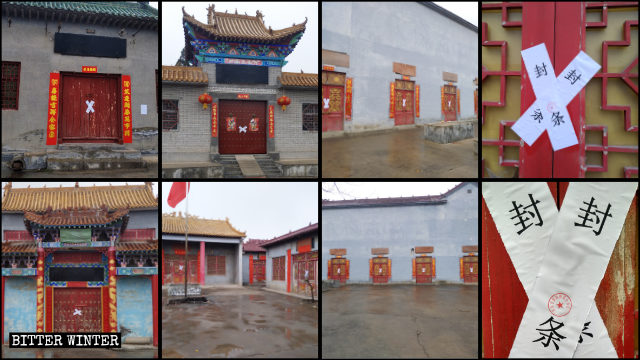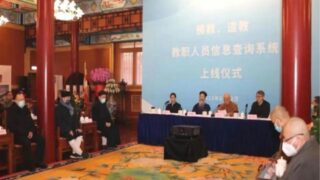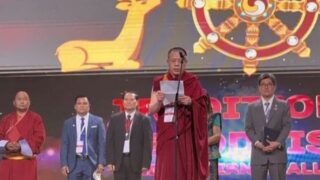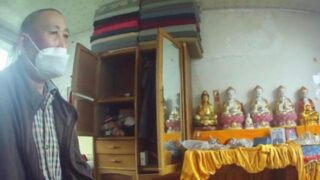Wanshan Forest Park in Henan Province used to house 13 temples. After numerous government inspections, all of them have been sealed off, believers driven away.
by Xin Lu
Apparently, the CCP’s determination to eliminate religious belief is not merely a matter of “going through formalities.” After shutting down religious venues, officials frequently conduct unannounced inspections to ensure that these sites will not be used again.
In previous years, every February, worshippers flocked to Wanshan Forest Park in Xingyang city in the central province of Henan. But this year, the park was unusually deserted. Only a few temples have secretly opened their doors to receive worshippers who came to burn incense.
Wanshan Forest Park housed 13 temples –Buddhist and folk religion – of varying sizes and was once acclaimed by locals as a “Buddhist holy site.” In April last year, the local government shut down all the temples. The names of the temples were covered, religious statues were removed, incense burners were destroyed, and donor recognition plaques were torn down.


“We open the temple secretly, and take things out, one day at a time,” said the person in charge of a temple. After the closure, she was feeling aimless, didn’t know what to do. But being able to remove the temple’s belongings gave her a sense of fulfilment, she even smiled a bit while talking.


From time to time, several people would come by to take photos in front of each temple. It turned out that these were not tourists wandering around.
“Didn’t you see those people taking photos a moment ago? They’re personnel from the Suohe subdistrict office of Xingyang city!” a person in charge of one of the temples said, as he and other believers from surrounding temples suddenly packed up their things in a panic and closed the temples’ gates.
“The government forbids opening temples and burning incense. Anyone who disobeys will be arrested!” the person in charge of another temple said with a frightened look.
A few days after photos were taken, officials returned and sealed the temples with paper strips, taking photos as proof. The next week, officials from the local Religious Affairs Bureau made three more unannounced inspections. They took pictures of the temples and even peeked inside the temples through windows to see if statues inside had been dismantled.


To prevent officials from Religious Affairs Bureau from approaching their temples unannounced, the persons in charge of some temples have used mesh wire and tree branches to block off the road leading to the temples, knowing very well that this will not help much; it is just to give themselves a little comfort.


“The government’s repeated unannounced inspections have scared us,” said the person in charge of a temple. “Everyone lives in fear now. We’re extremely cautious and don’t trust anyone. We’re afraid that they might be government officials who are here for an unannounced inspection.”
The persons in charge of some temples had secretly left hidden entrances to the temples for themselves. One of them said, “This temple is my home. No matter what, I have to go home.”
But even such a small wish as keeping one’s own “home” was soon shattered. The Supervision Team of the Special Operation Office from the Suohe subdistrict office in Xingyang city issued a notice on the problems discovered during the inspection, demanding that persons in charge of the temples be driven out and that all temple doors be locked. That way, there is no possibility that temples will be reopened for worshippers to burn incense.


The government’s method of driving out temple owners is very ruthless. The doors and windows of most temples have been blocked off with bricks and mud now. With no chance of returning, persons in charge of some temples had to leave for good


Now, since these temples were left unattended for a long time, the courtyards are overgrown with weeds, and the temples have become deserted, the sight causing people to sigh in despair. Just as before, the government’s campaign to thoroughly eliminate temples has emerged victorious.
In the massive campaign to shut down religious venues around the country, Wanshan Forest Park is just one example. Believers from even more house church meeting venues, Three-Self churches, and folk religion venues that have been shut down are still dealing with the government. Some of them have been left with nowhere to go after their places of worship were completely shut down. The government’s “return visit” operation—including all kinds of inspections and patrolling, and even the use of satellite positioning systems, aerial drones, and other high-tech tools and equipment to shut down religious venues—is still ongoing.









